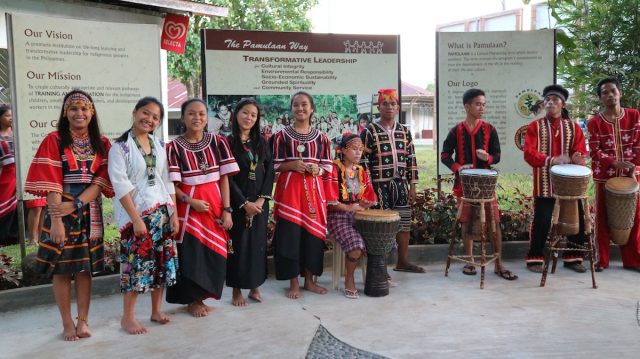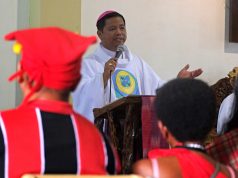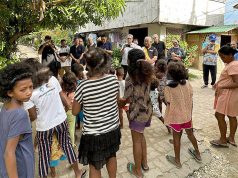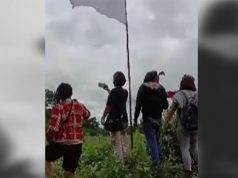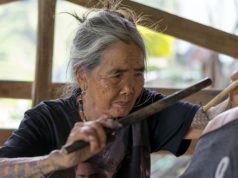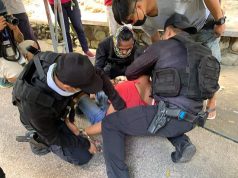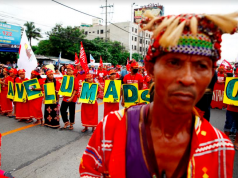DAVAO CITY, Philippines – It’s 4 a.m. and 19-year-olds Leah and Jonahver are getting out of bed in their dorms and washing up. With some 100 other college students from Pamulaan Center for Indigenous Peoples Education in Davao City, they gather in a circle in the schoolyard before the sun rises for their morning praise.
As stewards of The Living Heritage Center of Philippine Indigenous Peoples, a museum in their school, the two proceed to check on the exhibits and clean the area by 5 a.m. Thirty minutes later Leah and Jonahver are in the garden, tending to their vegetables. Breakfast is scheduled at around 6 a.m., and classes start at 7:30 a.m.
As third year students of Elementary Education, specializing in IP education, the girls have what they call a “loaded” agenda that contains not just the subjects prescribed by the Commission on Higher Education, but ones that are also rooted in their culture, as members of the Talaandig tribe in Bukidnon.
For example, they have a subject called Indigenous Knowledge, Value System, and Practices. They also study a lot of science subjects like Ecology and Environmental Science because of IPs’ “harmonious relationship” with nature, as Jonahver explains.
Their classes end at 4 p.m. Curfew is at 5 p.m., when the students have to be in Pamulaan. They resume gardening, then the assigned students from Education, Peace Education, Agriculture, Anthropology, and Social Entrepreneurship cook dinner for their respective coursemates.
Each week, a finance officer is tasked to handle the budget for the students’ food, and buy meat in the market. The vegetable garden provides tomatoes, cucumbers, sweet potato, pechay, and kangkong to make their meals complete. Students rarely eat instant noodles and canned goods.
General cleaning is set for Saturdays, which are also days for training and values formation. This month, the theme is conscientiousness, Leah says. Evening praise caps off each Saturday,
“Sunday lang talaga ‘yung matatawag namin na ‘me time’ namin (Sunday is the only day we can have ‘me time’),” Jonahver says. Students practice their different religions here, as well as their indigenous beliefs. Leah and Jonahver are Catholics, but they also believe in “Magbabaya” or the IPs’ concept of “God”.
Back home in the mountains of Bukidnon, they perform such rituals as “Pamuhat”, which Jonahver explains is “a form of thanksgiving” for the blessings they have received, such as an abundant harvest for the farming community.
They also sing songs, such as the Binukud translation of “Our Father”. They perform dances that mean various things, as well.
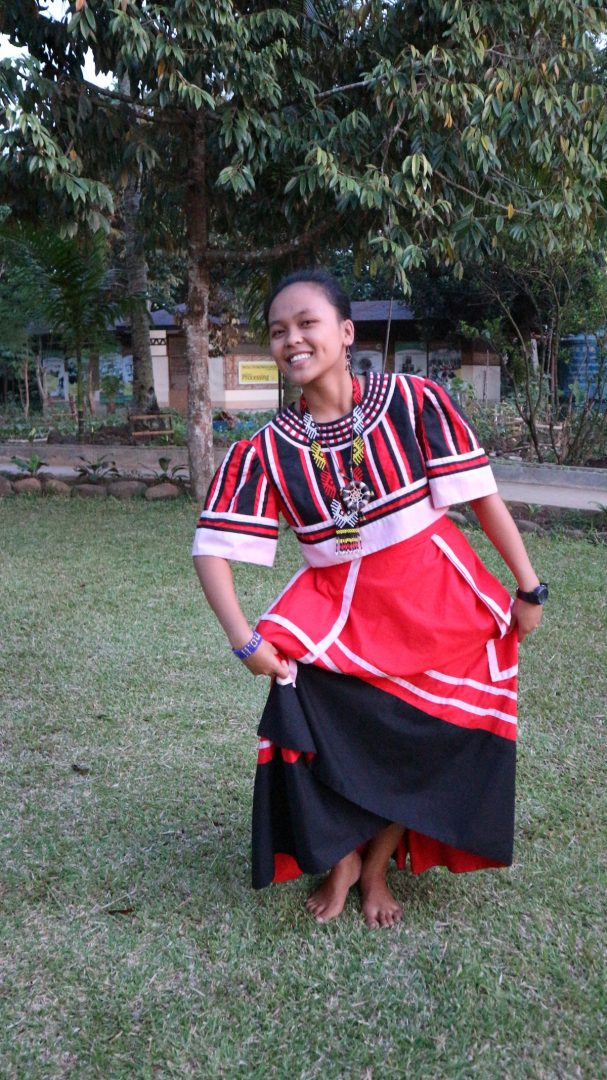
Pamulaan president and Magsaysay awardee Benjamin Abadiano acknowledges the rigors of this particular brand of education.
“Lutung-luto sila dito sa formation (They are thoroughly molded here through formation). Kasi nga ang palagi kong ine-emphasize sa kanila na (Because I always emphasize to them that) this is not a boarding house. Because if it’s a boarding house, you have your time of your own, right? You don’t have to follow certain rules, you don’t need to do certain things that are required in a formation house like this. So sila, talagang pag gising pa lang sa umaga meron na ‘yan silang regimen na sinusunod (So they really have a regimen that they follow as soon as they wake up in the morning),” he explains.
His goal is to maximize the students’ four years in college. “Magiging iba sila (We want them to be changed). When they graduate, they really become future leaders. Kasi ang pinaka-heart ng program namin dito is leadership (Because the heart of our program here is leadership).”
The school follows a “4Cs Model” made up of community vision, which explores what the IP community wants to achieve, and why they want their youth to study; mapping cultures and traditions, which figures out what aspects of the IPs’ culture can be integrated into the curriculum and into the development of programs; current realities and challenges, which reflects on the present events that affect the IPs’ communities; and the competencies as required by CHEd and the Department of Education.
It is a form of education that Abadiano believes is relevant to his students, who represent 24 ethnolinguistic groups this year.
“Knowledge-bearers” or the indigenous elders are consulted alongside the professors in developing the programs for the students.
The students are also immersed in life outside the school so they can implement projects and immediately make an impact on IP communities. They also visit jails and homes for the aged, then share their experiences to one another during reflection sessions on Saturdays.
“I love teaching na (now),” says Leah, who initially wanted to take up Social Entrepreneurship, but was advised by the school that her high grades made her better suited for Education. “Kasi one of our needs sa aming community is education talaga. Kasi sa aming community, especially sa mga sitios po, marami pa talagang illiterate, especially sa mga tao doon, wala talagang access sa education. So ‘yun kami talaga, babalik talaga kami sa community po para mag-serve (Because one of the needs in our community is really education. Because in our community, especially in the remote areas, there are still many who are illiterate, especially since the people there really don’t have access to education. So our plan is, we will really go back to our communities to serve).”
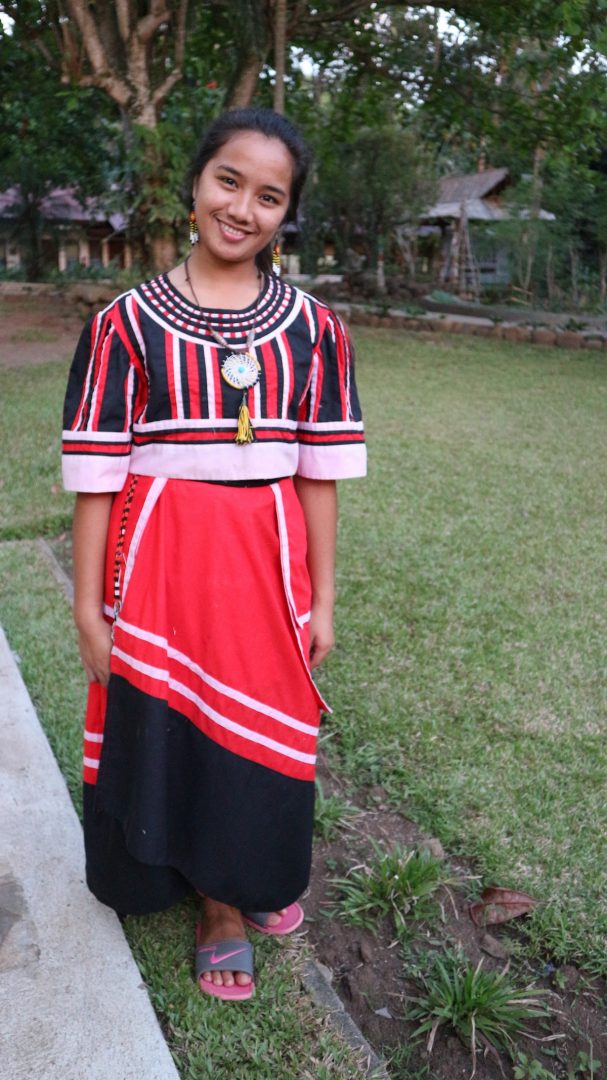
Jonahver pipes in: “Kailangan talaga ng education dun sa amin kasi parang hindi talaga mawawala ang discrimination against sa indigenous people. Kasi na-realize namin ‘yun talaga ‘yung way na magiging educated ‘yung mga indigenous people like us indigenous youth, parang magiging way kasi ‘yung education talaga na ma-lessen ‘yung discrimination (We really need education where we live because discrimination against indigenous people will always persist. We realized that by being educated, we indigenous people, we indigenous youth, have a way of lessening that discrimination).”
Their barangay, for example, is made up of 80 percent Talaandig and 20 percent non-IPs. The latter often imitate the way the IPs talk, look down on those who live high up the mountains, and gossip about them.
“Tapos usually kasi ‘yung pamumuhay namin, farming. Kumbaga kung mag-trade o pupunta sila doon para ibebenta ‘yung mga product nila, siyempre hindi naman maiiwasan talaga na madumi ‘yung mga damit sometimes tapos madudumi ‘yung paa at saka ‘yung kamay kasi siyempre ‘yun ‘yung way of living (Usually our livelihood is farming. So if they trade or go down to sell their products, of course they can’t avoid having dirty clothes, dirty feet, and dirty hands. Naturally, that’s their way of living),” Jonahver narrates.
It is Pamulaan that instilled in them the necessity of fighting for their fellow IPs’ rights, and to help their fellow IPs, she says.
DRIVEN OUT OF HOMES
And one of the issues they face, and their own schoolmates have experienced firsthand, is being driven out of their homes.
“Wala po silang ancestral domain land titles. Kaya po siguro ‘yung mga lowlanders pumupunta doon para pilitin ‘yung mga katutubo na maglipat kasi wala naman silang ebidensya na sa kanila talaga ‘yung lupa (They don’t have ancestral domain land titles. That’s probably why the lowlanders go there to force the IPs to move because they don’t have evidence that the land is truly theirs),” Leah explains.
She says she has classmates whose tribal leaders were killed for fighting for their rights over the land.
Jonahver hopes that the government will speed up the processing of certificates of ancestral domain land titles (CADTI).
She cited the example of a classmate: “12 years daw bago makuha ‘yung title. Paano na lang ‘pag may nakapasok na na mga plantation, ‘yung mga mining corporation, tapos hindi pa nabigay ‘yung isinusulong nila na title? Parang magiging useless din ‘yung process kung wala kaagad na implementation ‘yung land title (They say it takes 12 years before they can get a title. What if a plantation or a mining corporation arrives, and they still haven’t received their title? The process becomes useless if the implementation of the land title isn’t fast enough).”
She adds, “Kami kasi ‘yung imbis na sa amin ‘yung mismong lugar, kami ‘yung nadi-displace (Instead of owning the land we live on, we are displaced).”
Asked how the school explains these events to the students who have gone through them, Abadiano replies that it is precisely this that is tackled by their subject Development Aggression.
“Ang problema rin kasi (The problem is), you cannot just keep criticizing without creating alternatives. Kasi wala din silang choice eh, dahil kailangan nilang mabuhay, parang kapit sa patalim na sila (Because they don’t have a choice, because they need to live, they resort to desperate measures). ‘Yung iba nga, napipilitan silang ibenta (Some of them are even forced to sell their land), which is against the law. They cannot sell their lands. But they can have it for like a lease. Eh, minsan take advantage lalo na politicians (Sometimes people take advantage of them, like politicians),” he says.
FLATTENED MOUNTAIN, CHINESE ‘ISLANDS’
He cites as example the Mamanwa of Surigao, whose mountain home was “literally flattened” so the soil can be used for Chinese reclamation projects. Back in 2016, it was reported by various media outlets that Philippine soil was supposedly being used by the Chinese to build its artificial islands in the South China Sea.
“[They flattened the] Red Mountain. Kawawa ‘yung mga Mamanwa, wala na silang lupa (These poor Mamanwa, they are left with no land),” Abadiano says.
Another challenge the IPs face is militarization.
“‘‘Yung banat ng gobyerno sa mga NPA (New People’s Army), nasa gitna ‘yung mga IP. Kasi ang nangyari, ‘yung mga IP, pinipilit rin ‘yan ng mga NPA ire-recruit ‘yung mga younger ones, 12 years old, ganyan. Kasi kung hindi, hina-harass sila ng mga NPA. Military naman, gagawin silang mga CAFGU (Citizen Armed Force Geographical Unit). So nagpapatayan sila (The IP is caught in the middle of the government’s operations against the NPA. Because what happens is, the NPAs forcibly recruit the IPs, especially the younger ones, even at 12 years old. Because if not, they will be harassed by the NPA. As for the military, they turn the IPs into CAFGU. So they end up killing each other),” Abadiano says.
The rewards President Rodrigo Duterte promises for those who kill NPAs make the situation worse, Abadiano says.
“Kasi ang pagtingin lang nga nila, patayan lang ang solusyon… Kawawa ‘yung mga sila mismong mga IP, sila ‘yung nagpapatayan sa isa’t isa. Wala silang choice eh, kasi kung hindi, sabihin ng military, ‘Ah, ano kayo sa kabila.’ ‘Pag doon naman sa kabila… Kaya ang daming namamatay. Kawawang-kawawa sila talaga (Because they think that killing is the only solution… It’s such a pity that IPs are killing one another. They don’t have a choice either, because if not, the military will say, ‘Oh, you’re siding with the opposition.’ As for the opposition… That’s why so many die. They are in such a wretched state),” Abadiano adds.
There is hope, nevertheless, in Pamulaan’s graduates, many of whom are now working with the DepEd’s IP education program.
The tirelessness of Abadiano – he teaches in Manila and flies to Davao City weekly to check on his students, all the while managing other nongovernment organizations working for marginalized sectors – as well as that of friends like the Fides Foundation people who provide financial support, are also reasons to be optimistic.

But most of all, the determination, intelligence, and goodness found in the likes of Leah and Jonahver are a great source of inspiration.
Asked what they want others to know about indigenous peoples, Jonahver replies, “Kaming mga katutubo, may uniqueness kami in terms of having a rich heritage, sa culture namin, sa tradition namin… Gusto namin na maintindihan nila na kung ano ‘yung way of living namin… Gusto namin na sana respetuhin (kami), gusto namin kung ano kami, tanggapin kami, tapos gusto din namin sana maipagpatuloy ‘yung may boses kami sa government (We indigenous people have a uniqueness in terms of having a rich heritage, culture, and traditions… We want them to understand what our way of living is… We want them to respect us, to accept us for who we are, and we hope to continue having a voice in the government).”
She stresses that their communities have needs, such as goods and services, as well as education.
Leah adds, “Ang gusto ko lang naman po is may equal treatment po kasi pareho lang naman tayong tao… Kung ano ‘yung naririnig nila sa mga katutubo, ‘yung mga sinasabi nilang, ‘’Yung mga katutubo ‘yung mga maiitim, ‘yung mga kulot,’ ‘yung mga ganyan, sana wala na ngayon kasi iba-iba naman tayo. Kasi kami, we claim nga, unique talaga kami as indigenous people (All I want is equal treatment, because we are all humans… Whatever they hear about indigenous people, the things they say like, ‘IPs are dark, have curly hair,’ things like that, I hope these will eventually end, because we are all different. Because we claim that we are truly unique, as indigenous people).”

